
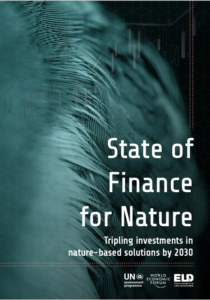 Geneva: Our livelihoods depend on nature. More than half of the world’s total GDP is moderately or highly dependent on nature. Agriculture, food and beverages and construction are the largest sectors that are dependent on nature. However, our collective failure to date to understand that nature underpins our global economic system, will increasingly lead to financial losses, according to the State of Finance for Nature report released today.
Geneva: Our livelihoods depend on nature. More than half of the world’s total GDP is moderately or highly dependent on nature. Agriculture, food and beverages and construction are the largest sectors that are dependent on nature. However, our collective failure to date to understand that nature underpins our global economic system, will increasingly lead to financial losses, according to the State of Finance for Nature report released today.
A total investment in nature of USD 8.1 trillion is required between now and 2050 – while annual investment should reach USD 536 billion annually by 2050 – in order to successfully tackle the interlinked climate, biodiversity, and land degradation crises, the report – produced by the UN Environment Programme (UNEP), the World Economic Forum (WEF) and the Economics of Land Degradation (ELD) Initiative (a global initiative established in 2011 by the United Nations Convention to Combat Desertification, the German Federal Ministry for Economic Cooperation and Development, and the European Commission) hosted by the Deutsche Gesellschaft für Internationale Zusammenarbeit (GIZ) in collaboration with Vivid Economics – states.
The report finds that annual investments in nature-based solutions (NbS) will have to triple by 2030 and increase four-fold by 2050 from the current investments into nature-based solutions of USD 133 billion (using 2018 as base year).
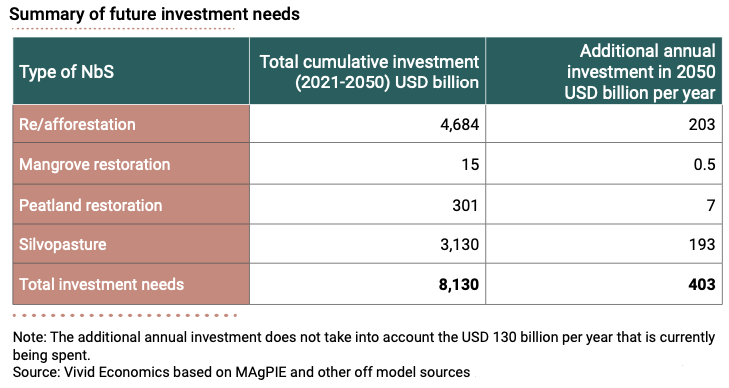
According to the report, NbS support a transformational shift of the economy, by relying on nature to address societal challenges. These societal challenges range from disaster risk reduction, climate change and biodiversity loss, to food and water security as well as human health. NbS can be cheaper solutions than standard (non- natural) solutions over the longer term, owing to the potential for responding to damages and the ensuing avoided costs.
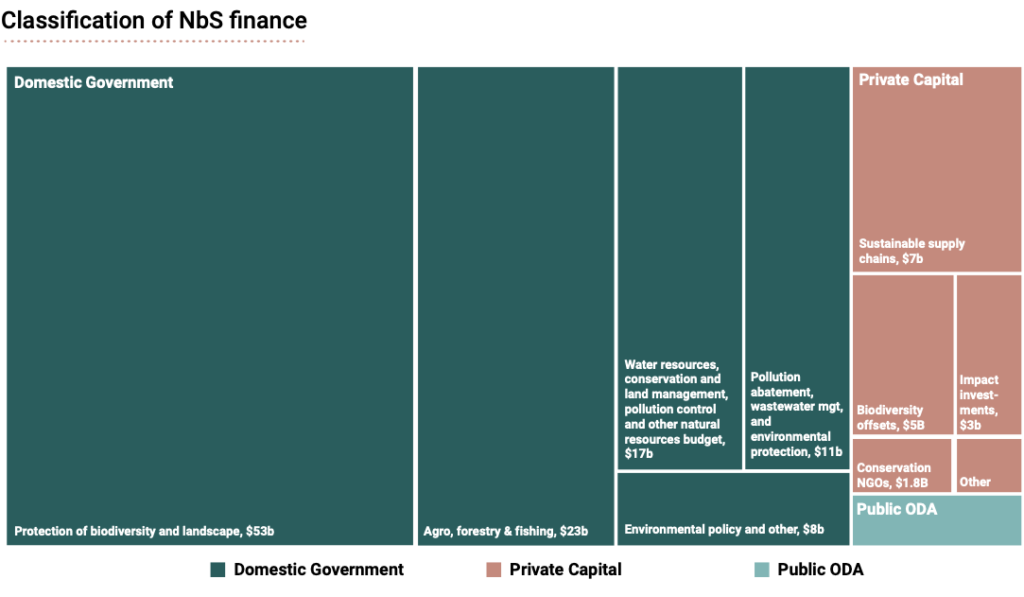
“No one can be in any doubt that we are in a planetary emergency. The interrelated crises of biodiversity loss, land degradation and climate change — driven by unsustainable production and consumption — require urgent and immediate global action,” Inger Andersen, Executive Director, UN Environment Programme, and Klaus Schwab, Founder and Executive Chairman, World Economic Forum, wrote in the Foreword to the report. They referred to a recent joint study by UNEP and the University of Oxford “Are we building back better?” that revealed that out of USD 14.6 trillion the world’s 50 largest economies announced in fiscal spending in the wake of COVID-19, just USD 368 billion (2.5 per cent) were directed towards green initiatives. “The lessons are not being learned. As governments plan their COVID recovery policies stimulus plans, we urge world leaders to ensure that public funding helps meet objectives under the Paris Climate Agreement and serves to halt and reverse the loss of biodiversity,” both said.
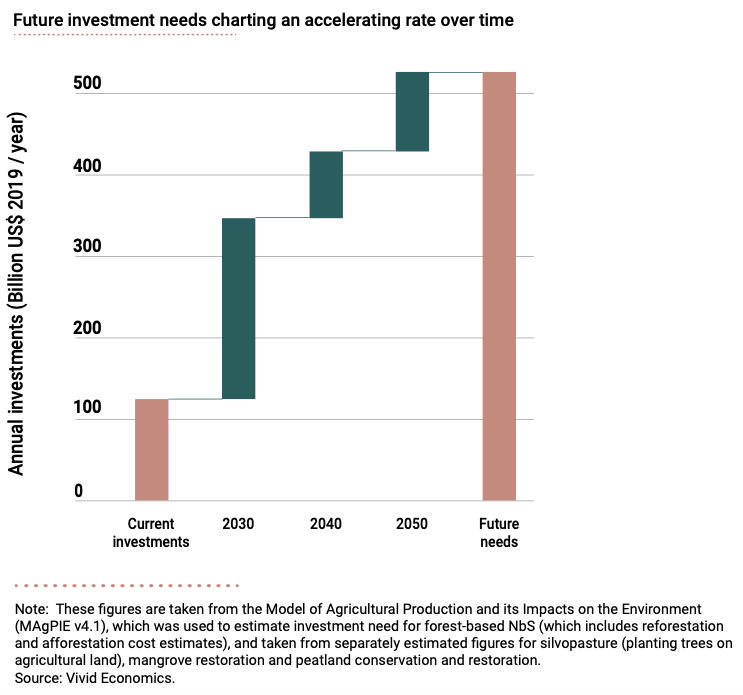
The authors of the report urge Governments, financial institutions and businesses to overcome this investment gap by placing nature at the heart of economic decision-making in the future. They point out that three-quarters of the land and two-thirds of the marine environment have been significantly altered by human actions. Since the beginning of civilisation, the world has lost half of its forests, half of coral reefs, 70 per cent of wetlands and dammed two-thirds of the world’s main rivers. Wildlife populations have, on average, declined by 60 per cent since 1970 and there is the potential for our actions to cause the loss of 1 million species according to the most recent findings of the Intergovernmental Panel on Biodiversity and Ecosystem Services.
Besides, the report states, 12 million ha of land is becoming degraded due to its unsustainable use every year, in addition to the two billion ha of already degraded land. Much of this land contains irrecoverable carbon, such as that found in peatlands, mangroves and old growth forest ecosystems. Furthermore, approximately 1.3 billion people are trapped on degrading agricultural land. Farmers on marginal land, especially in the drylands, have limited options for alternative livelihoods, and are often excluded from wider infrastructure and economic development.
The authors link the ongoing loss of nature to a systemic risk for the global economy as their report found over half the world’s GDP depends on nature even as currently, the majority of the essential benefits of nature have no financial market value, “despite underpinning our current and future prosperity”. The report states that from government policies related to procurement, taxation, trade and regulation, to the way businesses and financial institutions make decisions on investment, risk and disclosure, “it is vital that we hardwire into our economic system the value of nature in a profound way”.
It further articulates that nature loss is at the heart of many societal challenges, while nature-based solutions hold the potential to address interlinked crises: “The pace of species extinction, global warming, the growing number of extreme weather events and zoonotic diseases like Covid-19, have further reinforced the need to invest in sustainable action that enhances the resilience of ecosystems and addresses societal challenges, such as food security, climate change, water security, human health and enhanced resilience to disaster risk.”
It calls for a fundamental shift in mindset, “transforming our relationship with nature, in order to ensure that humanity does not breach the safety limits of the planetary boundaries”.
Unlocking the potential of nature-based solutions to close the finance gap by 2050
The authors of the report stress the need to rapidly accelerate capital flows to nature-based solutions by making nature central to public and private sector decision-making related to societal challenges, including tackling the climate and biodiversity crises.
Structural transformations are needed to close the USD 4.1 trillion finance gap between now and 2050, by building back more sustainably in the wake of the Covid-19 pandemic, but also by repurposing harmful agricultural and fossil fuel subsidies and creating other economic and regulatory incentives. Investing in nature supports human, animal and planetary health, improves quality of life, and creates jobs. However, nature currently only accounts for 2.5% of projected economic stimulus spending in the wake of Covid-19. Private capital will also have to be scaled up dramatically to close the investment gap. Developing and scaling up revenue flows from ecosystem services and using blended finance models as a means to crowd in private capital are among the suite of solutions needed to make this happen, which also requires risk- sharing from private sector entities.
“Biodiversity loss is already costing the global economy 10 percent of its output each year. If we do not sufficiently finance nature-based solutions, we will impact the capacities of countries to make progress on other vital areas such as education, health and employment. If we do not save nature now, we will not be able to achieve sustainable development,” said UNEP Executive Director, Andersen. “The report is a wake-up call for Governments, financial institutions and businesses to invest in nature — including reforestation, regenerative agriculture, and restoration of our Ocean,” she said, adding that countries and leaders of industry will have an opportunity to do so at the upcoming summits related to climate, biodiversity, land degradation and food systems, and in the context of the UN Decade on Ecosystem Restoration (2021-2030).
Investing smarter: Reimagine, recreate, restore
Forest-based solutions alone, including the management, conservation and restoration of forests, will require USD 203 billion in total annual expenditure globally, according to the report. That is equivalent to just over USD 25 per year for every citizen in 2021. The report calls for coupling investments in restoration action with financing conservation measures. This could result in forest and agro-forestry (the combination of food production and tree growing) area increases of approximately 300 million hectares by 2050, relative to 2020.
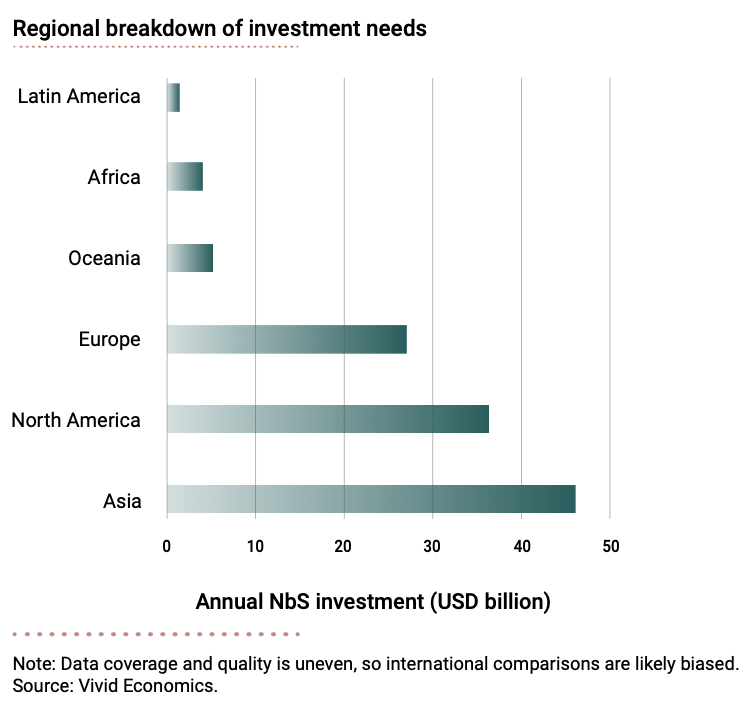
The upcoming summits on climate, biodiversity, land degradation and food systems, as well as the launch of the UN Decade on Ecosystem Restoration on 5 June 2021 provides an opportunity to harness political and business momentum to align the economic recovery with the Paris Agreement and the anticipated post-2020 Global Biodiversity Framework, and thus be consistent with limiting warming to 1.5° C above pre-industrial levels, as well as halting and reversing the loss of biodiversity.
Making nature a business and investment case
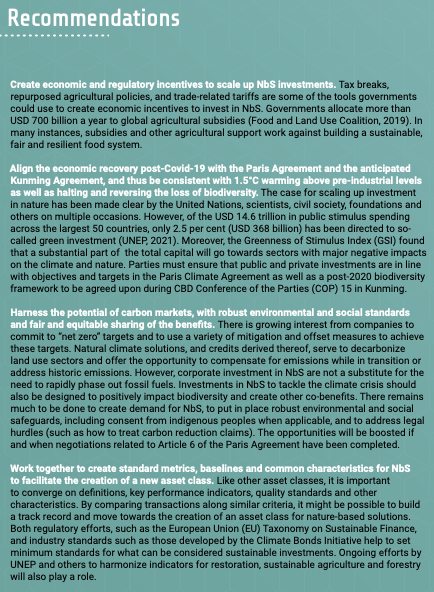
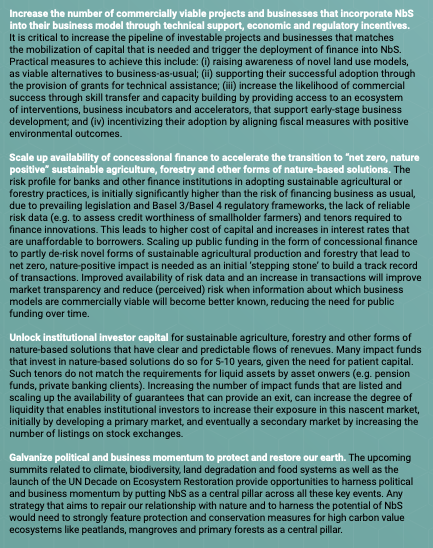
The report’s authors say the annual investment of the private sector in nature-based solutions was equal to USD 18 billion in 2018. Private finance only accounts for 14%, including capital mobilized through sustainable agricultural and forestry supply chains, private equity investments, biodiversity offsets financed by private sectors, philanthropic capital, private finance leveraged by multilateral organizations and forest and other land use-related carbon markets.
In climate finance, private sector investment accounts for most capital flows (56% according to the Climate Policy Initiative). The scaling up of private capital for nature-based solutions is one of the central challenges of the next few years with a specific focus on investing in nature to support sustainable economic growth in the 21st century.
Investors, developers, market infrastructure makers, customers and beneficiaries can play roles in creating a market where nature-based solutions access new sources of revenue, increases resilience of commercial activities, reduces costs or contributes to reputation and purpose.
While a number of private sector-led initiatives have already emerged, the report stresses the need for companies and financial institutions to increasingly be part of the solution by sharing the risk and committing to boost finance and investment in nature-based solutions in an ambitious way and with clear, time-bound targets. While investments in nature-based solutions cannot be a substitute for deep decarbonization of all sectors of the economy, they can contribute to the required pace and scale of climate change mitigation and adaptation.
– global bihari bureau




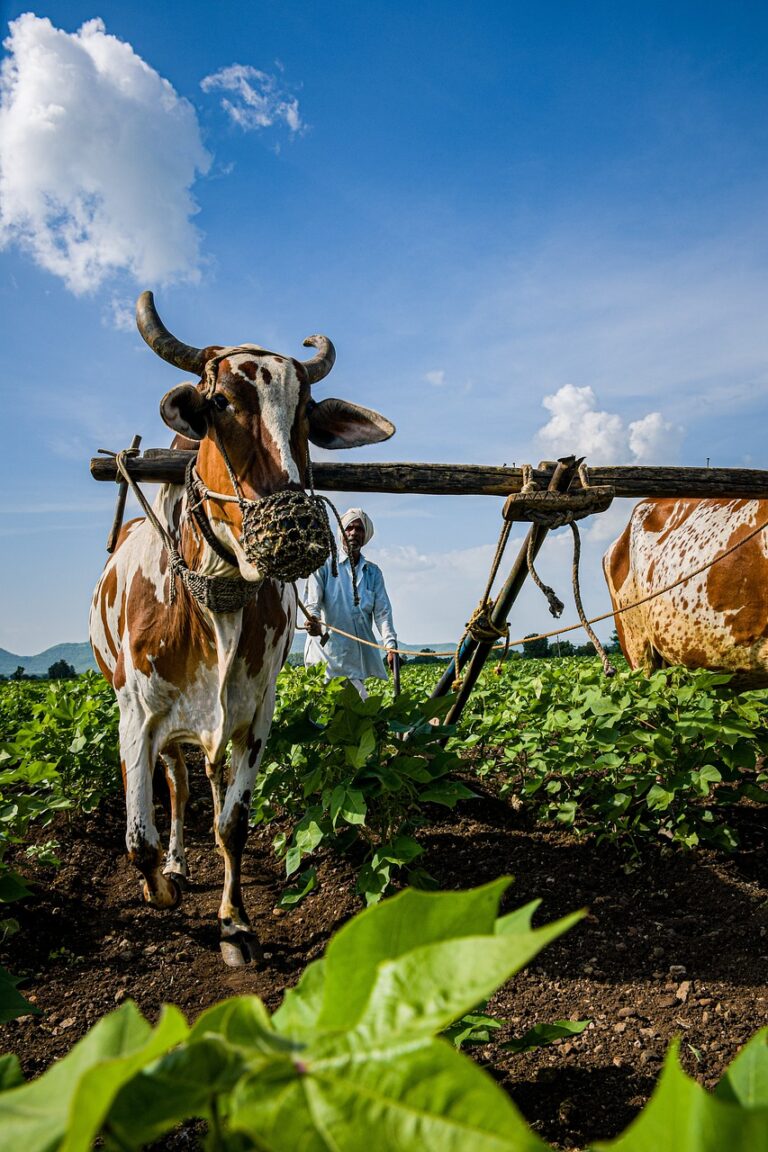

Excellent blog!